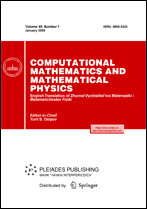|
|
Zhurnal Vychislitel'noi Matematiki i Matematicheskoi Fiziki, 2010, Volume 50, Number 5, Pages 787–804
(Mi zvmmf4870)
|
|
|
 |
This article is cited in 6 scientific papers (total in 6 papers)
Block tensor conjugate gradient-type method for Rayleigh quotient minimization in two-dimensional case
O. S. Lebedeva
Faculty of Computational Mathematics and Cybernetics, Moscow State University, Moscow, 119992 Russia
Abstract:
A method for solving a partial algebraic eigenvalues problem is constructed. It exploits tensor structure of eigenvectors in two-dimensional case. For a symmetric matrix represented in tensor format, the method finds low-rank approximations to the eigenvectors corresponding to the smallest eigenvalues. For sparse matrices, execution time and required memory for the proposed method are proportional to the square root of miscellaneous overall number of unknowns, whereas this dependence is usually linear. To maintain tensor structure of vectors at each iteration step, low-rank approximations are performed, which introduces errors into the original method. Nevertheless, the new method was proved to converge. Convergence rate estimates are obtained for various tensor modifications of the abstract one-step method. It is shown how the convergence of a multistep method can be derived from the convergence of the corresponding one-step method. Several modifications of the method with an low-rank approximation techniques were implemented on the basis of the block conjugate gradient method. Their performance is compared on numerical examples.
Key words:
low-parametric representations, low-rank matrices, methods for calculating small eigenvalues, block conjugate gradient method.
Received: 17.11.2009
Revised: 21.12.2009
Citation:
O. S. Lebedeva, “Block tensor conjugate gradient-type method for Rayleigh quotient minimization in two-dimensional case”, Zh. Vychisl. Mat. Mat. Fiz., 50:5 (2010), 787–804; Comput. Math. Math. Phys., 50:5 (2010), 749–765
Linking options:
https://www.mathnet.ru/eng/zvmmf4870 https://www.mathnet.ru/eng/zvmmf/v50/i5/p787
|


|





 Contact us:
Contact us: Terms of Use
Terms of Use
 Registration to the website
Registration to the website Logotypes
Logotypes







 Citation in format
Citation in format 
